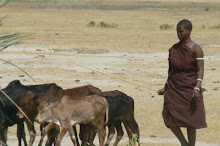
The four Kenyans are taking the British Government to court over allegations of torture during the Mau Mau uprising
Four elderly Kenyans have won an important fight in their battle for compensation over horrific acts of torture.
The group, all in their 80s, say they were assaulted in British-run detention camps during the country’s war of independence.
They allege 'unspeakable acts of brutality' during the Mau Mau rebellion against colonial rule between 1952 and 1960.




Locked up: Members of the Mau Mau rounded up and entrapped in a police cage in Nairobi
In a 'historic' ruling, the High Court said they had 'arguable
cases in law' and rejected Government attempts to have the case thrown out.
The Foreign Office, which denies liability, said the group had left it too late to claim and the case should be targeted against the assault perpetrators.
The judgment, by Mr Justice McCombe, clears the way for a month-long hearing before Easter where they will tell their stories.
If they win, it could lead to thousands more demanding compensation via no-win no-fee lawyers.
One of the claimants, Wambugu Wa Nyingi, says he was suspended by his feet and severely beaten while cold water was poured on his face to stop him breathing.
Ndiku Mutwiwa Mutua and Paulo Muoka Nzili were castrated. Jane Muthoni Mara says she was suffered appalling sexual abuse.
Some 12,000 rebels are thought to have been killed in the battle for independence.
Solcitor Martyn Day said that this hearing, which will decide the Government's argument that the claims cannot proceed because they have been brought outside the legal time limit, was in itself a 'major victory.'
He said: 'A lot of the evidence about what happened will be put into the public domain, and people will be able to judge for themselves.
'So, even if the judge rules that the trial cannot go ahead because of the time that has passed, just having that trial is a major victory.'
The Foreign and Commonwealth Office (FCO) had asked the judge to block the litigation now on the basis that any claim could only have been brought against the direct perpetrators of the alleged assaults or their employer at the time - the Colonial Government in Kenya - and not the British Government.
But the judge rejected the strike out application today saying: 'I have not found that there was systematic torture nor, if there was, the UK government is liable.
'I have simply decided that these claimants have arguable cases in law.'
'The rival factual contentions are hotly disputed. I have found that it is impossible at this stage of the proceedings to decide that the FCO must be correct in its factual assessments and arguments.
'It has been necessary, therefore, to consider the case on the basis that the claimants' version of the facts may prove at trial to be correct and to ask whether, on that basis, they have an arguable claim in law against the UK Government.'
The claimants, Ndiku Mutwiwa Mutua, Paulo Muoka Nzili, Wambugu Wa Nyingi and Jane Muthoni Mara - all but one of whom are in their 80s - flew 4,000 miles from their rural homes for the trial this spring which concentrated on events in detention camps between 1954 and 1959, but were not in court today.
At that hearing the judge was told that Mr Mutua and Mr Nzili had been castrated, Mr Nyingi was beaten unconscious in an incident in which 11 men were clubbed to death, and Mrs Mara had been subjected to appalling sexual abuse.










.jpeg)




.png)






No comments:
Post a Comment